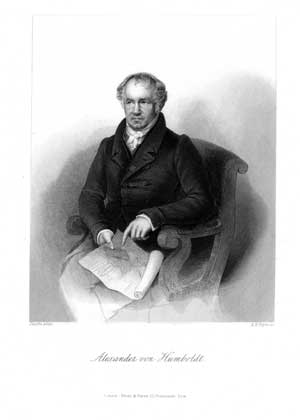
Our Interests
Programs We Offer
Journals We Publish
Our Campus and Nature Reserves
Individual and Group Retreats
About Downeast Maine
Community Engagement
About Us
Donate Now
Contact Us

The Legacy of Alexander von Humboldt (1769 to 1859)
Alexander von Humboldt’s legacy has endured to the present day, and influences many of the objectives of the Institute. Humboldt first became known through his daring and pioneering five-year research expedition in Central and South America and the Caribbean, from 1799 to 1804. By the time he started his expedition, Humboldt was exceptionally well-versed in most of the scientific disciplines of his day. He took with him the latest in scientific instrumentation. Enduring incredible hardships, he never diverted from his goal of observing and studying nature, tirelessly collecting botanical, zoological, geological, and meteorological specimens and data, and recording his observations and reflections in great detail. The dedication and enthusiasm that shine through the personal narrative of his journey have been a source of inspiration for generations of naturalists and scientists, among them Charles Darwin. When Darwin set out on his historic voyage on the Beagle thirty-seven years later, he traveled with a translation on board of Humboldt’s “Personal Narrative,” from which he memorized entire passages by heart.
Humboldt’s expedition was the first extended journey to the Americas undertaken for scientific research purposes. To this day, Humboldt is respected throughout Central and South America as the “scientific discoverer of the New World.” Evaluating and expanding upon the immense scientific and scholarly harvest from his expedition became Humboldt’s preoccupation for his remaining life. Through his writings, lectures, letters, and conversations, he greatly influenced the scholars and scientists of his time. As a creative thinker, who was given to a comparative and interdisciplinary approach to science, he contributed to the early development of many different fields of science. Many disciplines were significantly inspired by Humboldt’s work. For example, based on observations during his expedition, Humboldt was the first to formally propose the fundamental principles underlying the distribution of plant species. He is therefore recognized as the founder of the science of biogeography. Through the universality of his outlook, Humboldt anticipated the modern study of ecosystems. For him, detailed research was not an end in itself. In his Ansichten der Natur, Humboldt wrote ... “the aims I strive for are an understanding of nature as a whole, proof of the working together of all the forces of nature.” Humboldt made important contributions to the early development of the marine sciences, especially to the concept of ocean currents and their impact on climate. His theory of vertical movement of water in the oceans dominated science for over half a century. His description of the Gulf Stream and Peru Current were a driving force for scientific research, and are considered masterpieces of oceanographic literature.
On the return voyage from his five-year expedition, Humboldt visited Philadelphia and Washington, DC, and became deeply interested in the United States. He met and became a life-long friend and correspondent of Thomas Jefferson. Humboldt’s maps and scientific methods were of strategic value during the exploration of the American West. No less than twenty towns, two lakes, one bay, one river, five mountains, and one university in the West were given Humboldt’s name.
The admiration which Humboldt earned and enjoyed throughout his life was due also to his encouragement of young scientists, as well as to his warm and engaging personality. Steeped in the European classical movement of his time, he embraced its humanitarian values. Throughout his life, Humboldt asserted the dignity and worth of all peoples and spoke out against slavery and colonialism. He is recognized as having played a key role in the liberation of the Spanish colonies in the New World.
Eagle Hill Institute Steuben, Maine 04680 207.546.2821 Ext. 4
office@eaglehill.us
The Institute is dedicated to building upon the philosophical and intellectual legacy of Alexander von Humboldt. It brings renewed attention to Humboldt's many contributions as a naturalist and scientist, and particularly to his philosophy about the study of nature. It is always timely to reflect upon how elegantly Alexander von Humboldt encouraged people to avoid the limitation of a mostly empirical and practical view of nature, and how his writings still inspire us to see our environment as an organic whole ... a living cosmos.
Humboldt's American Travel Journals